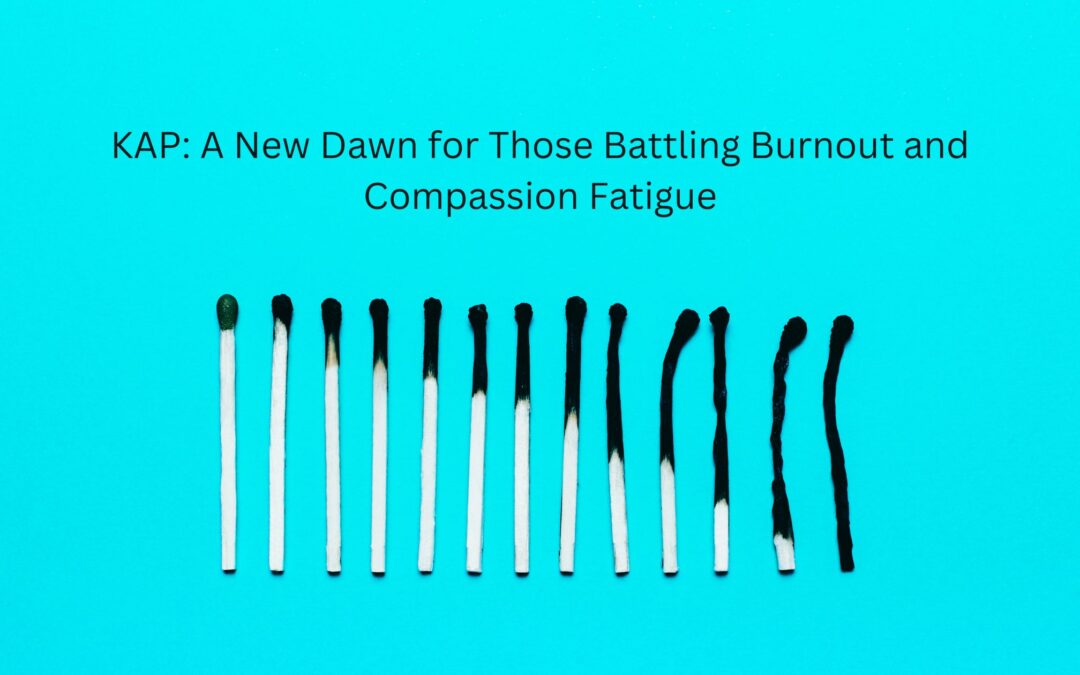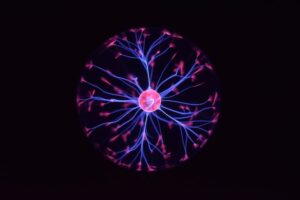In the relentless pursuit of caring for others, it’s not uncommon for healthcare professionals and first responders to encounter the twin shadows of burnout and compassion fatigue. These are not just mere occupational hazards but deep emotional and psychological states that significantly impact your well-being and efficacy. As a therapist, I’m here to introduce a beacon of hope in this challenging journey: Ketamine-Assisted Psychotherapy (KAP).
Understanding the Depths of Burnout and Compassion Fatigue

Burnout encapsulates the physical and emotional exhaustion you experience when you feel overwhelmed and unable to meet constant demands. Compassion fatigue, on the other hand, is the emotional residue or strain of exposure to working with those suffering from the consequences of traumatic events. Both profoundly affect your ability to provide care and maintain a healthy personal and professional life.
Why Ketamine-Assisted Psychotherapy?
Ketamine-assisted psychotherapy (KAP) represents a groundbreaking approach to treating these conditions. Ketamine, long used as an anesthetic, has shown promising results in addressing depression, anxiety, and PTSD – conditions often coexisting with burnout and compassion fatigue.
During KAP sessions, doses of ketamine are administered under Catalyst therapists who are certified psychedelic-assisted therapy providers, creating a unique therapeutic window. This state facilitates deeper introspection and a heightened state of openness to therapeutic interventions.
The Dual Benefit of KAP
KAP offers a dual benefit. First, it provides symptomatic relief from the overwhelming feelings of burnout and compassion fatigue. Second, and more importantly, it creates an opportunity for meaningful psychological work. In this altered state of consciousness, you can explore and address the underlying issues contributing to your emotional state. With KAP, we can tend to your mental garden – not only do we water the plants (symptomatic relief), but we also nurture the soil (addressing underlying issues), ensuring healthier, more resilient growth.
Why Target Burnout with KAP?
As frontline caregivers, your well-being is crucial, not just for your own health but for those you serve. Traditional therapy and self-care strategies are essential, but sometimes, they aren’t enough. KAP provides an additional, potent tool in this fight against burnout and compassion fatigue. KAP targets burnout through its neurological effects and facilitates a deep, introspective, and often spiritual journey that can rejuvenate your sense of purpose and passion in your work.
Neurological Impacts of KAP in Targeting Burnout
Rewiring the Brain: Ketamine, at its core, is an NMDA receptor antagonist. Inhibiting these receptors helps in ‘resetting’ specific neural pathways associated with stress and emotional pain. When you’re experiencing burnout, your brain is often stuck in a loop of negative thinking and stress responses. Ketamine helps to disrupt these patterns, offering a kind of ‘neurological reset.’ This can be likened to rebooting a computer that’s stuck, giving the brain an opportunity to start afresh with healthier thought patterns.
- Enhanced Neuroplasticity: During and after a KAP session, there’s an increase in neuroplasticity – the brain’s ability to form new connections and pathways. This heightened state of neuroplasticity allows for more effective psychotherapy as patients are more receptive to new perspectives and ways of thinking. It’s like paving new roads in a well-worn mental landscape, making it easier to move away from the pathways of burnout.
- Reduction in Inflammatory Markers: Chronic stress and burnout are associated with increased levels of inflammation in the brain, which can negatively affect mood and cognitive function. Ketamine has been shown to reduce these inflammatory markers, helping alleviate burnout’s physiological components.
Spiritual and Emotional Dimensions of KAP in Addressing Burnout
- Altered States of Consciousness: KAP often induces a unique state of consciousness where patients can gain new insights and perspectives. This altered state can be a powerful tool for spiritual exploration and self-reflection. It’s a space where you might step back from the overwhelming details of daily life and see the bigger picture, reconnecting with your purpose and passion.
- Emotional Release and Healing: In the state facilitated by ketamine, many find it easier to access and process suppressed emotions. This cathartic release can be profoundly healing, offering relief from the emotional burden of burnout. It can be compared to opening the valves of a dam that’s been holding back emotional waters, allowing for a healthy flow and release of pent-up feelings.
- Reconnection with Self: Burnout often leads to a disconnection from one’s self and values. The introspective quality of KAP can help in reestablishing this connection, aligning one’s professional role with personal values and beliefs. This realignment is crucial in finding meaning and satisfaction in one’s work, countering the feelings of emptiness often associated with burnout.
- Integration of the Experience: Post-KAP therapy sessions focus on integrating these experiences and insights into your everyday life. This integration is key to making lasting changes that go beyond the immediate effects of the medication, fostering a sustainable recovery from burnout.
Our KAP program provides a holistic approach, treating both the mind and the spirit, and offering a path to recover from burnout and find a more sustainable and fulfilling way to continue your invaluable work.
A Call to Action

As a therapist committed to your well-being, I invite you to explore Ketamine-Assisted Psychotherapy as a viable option for overcoming burnout and compassion fatigue. Together, we can work towards a future where you can continue to provide care without sacrificing your well-being. Remember, taking care of yourself isn’t just a personal necessity; it’s a professional responsibility. Let us help you light your candle once more so you can continue to shine brightly in the lives of those you help.
KAP can be a valuable tool for those in high-stress caregiving roles. If you’re exploring ways to manage burnout and compassion fatigue, please consider this as an invitation to discuss how KAP might be right for you.
Photo Credits:
Photo by Anjo Antony on Unsplash
Photo by Stefano Bucciarelli on Unsplash
Photo by Claudio Schwarz on Unsplash


 Rewiring the Brain
Rewiring the Brain

